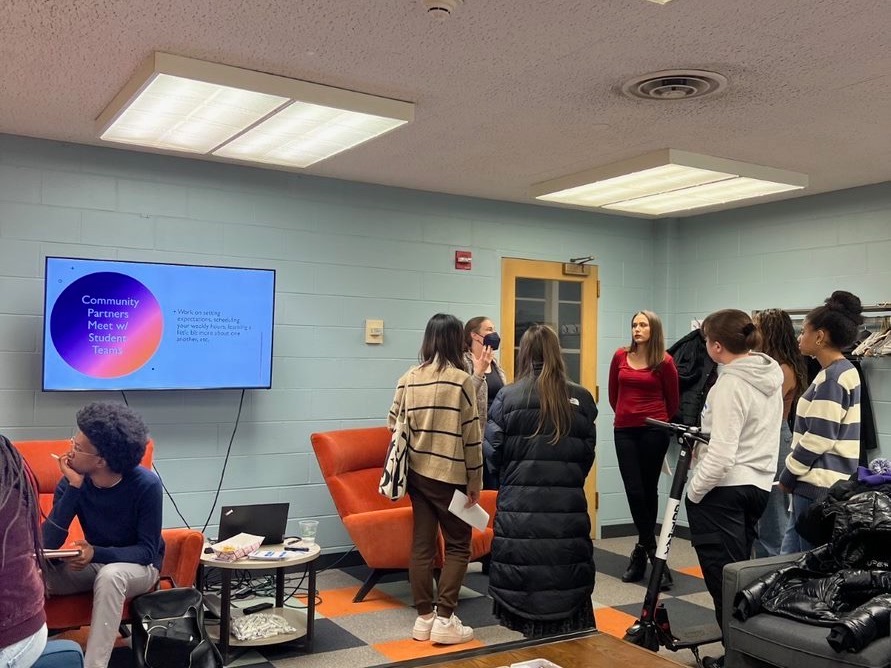Leadership for Racial Equity program connects Evanston with NU students
Photo courtesy of Daniella Feijoo
Students meet with community members at a Leadership for Racial Equity program meeting. Leadership for Racial Equity aims to connect NU students with advocates in the Chicago area.
February 6, 2023
Hannah Bonham Blackwell, co-founder of Southside Blooms, spends her days fighting for racial equity — but with a floral twist.
Through Southside Blooms, a project of Chicago Eco House, she employs at-risk youth to grow and sell flowers in south Chicago.
“There’s just not the same economic opportunities here, and unfortunately, those follow racial lines,” Bonham Blackwell said. “For us, this was evening the playing field.”
Bonham Blackwell works for one of four Chicago-area organizations working with 18 students in Northwestern’s Leadership for Racial Equity program.
The eight-week program, which launched at the beginning of the quarter, partners undergraduate students with community-based organizations to contribute to grassroots racial equity efforts in the Evanston and Chicago area. The program is run by the University’s Leadership Development & Community Engagement department.
With Southside Blooms, NU students are working on community outreach and youth workshops.
“I love that the students that I’m working with are all in,” Bonham Blackwell said. “They’re totally for doing whatever, and to me, that shows that it isn’t just an intellectual thing. It’s really connected to their heart.”
LDCE Assistant Director Daniella Feijoo said the department noticed high demand from students for a program focused specifically on racial equity.
So they launched a program to connect with the YWCA Evanston/North Shore, Kids Create Change, Evanston Township High School and Southside Blooms.
“We saw interest from students across the board,” Feijoo said. “As we see these issues being really prevalent in local, national and global news around racial equity work, we wanted to provide students with a space to process those events and get plugged in with the local community.”
NU and ETHS students connect through Advancement Via Individual Determination, a college-prep program, and a series of affinity-based summits.
The University’s ETHS Partnership Coordinator Kristen Perkins-LaFollette hopes to foster a relationship that defies what she described as the typical university-high school relationship rooted in hierarchy.
“How do they make sure that (college students are) not approaching it from a white savior standpoint or a paternalistic mindset?” Perkins-LaFollette said. “How are they really respecting folks who have been in this community — folks who’ve done the work and are doing the work before them and will continue after they graduate?”
Weinberg freshman Jada Hikary said she has learned a lot about navigating conversations around racial justice through her work with the YWCA.
She also said she appreciates how the program helps her connect with community members outside the campus bubble.
“I see such a small part of Evanston,” Hikary said. “Northwestern is a very closed campus, so I just want to really be able to integrate myself in the community.”
Feijoo said she is overjoyed to see NU students’ engagement and hopes they will sustain relationships with their community partners beyond the end of Winter Quarter in March.
She said she’s considering expanding the program in future years, potentially to a year-long cohort program.
“I love seeing the interdisciplinary focus that (NU) students have at the school and their deep commitment to doing good work, being ethical and wanting to learn what it looks like to be a good neighbor,” she said.
Email: [email protected]
Twitter: @llilysshen
Related Stories:
— Northwestern’s Racial Equity and Community Partnership grants impact local communities












